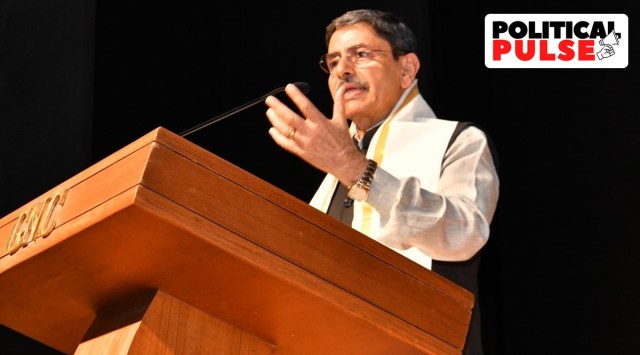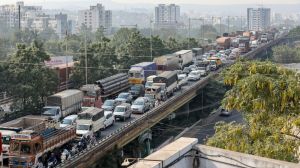Govt vs Governors: Deciphering the ‘Raj’ in Raj Bhavan
R N Ravi may have gone one step further than most in Tamil Nadu, but from West Bengal to Maharashtra, Telangana to Punjab, non-BJP-ruled states have been in constant conflict with governors
 Tamil Nadu Governor R N Ravi evening dismissed removed arrested minister V Senthil Balaji from the Council of Ministers,(Credits: Twitter -- Tamil Nadu Raj Bhavan)
Tamil Nadu Governor R N Ravi evening dismissed removed arrested minister V Senthil Balaji from the Council of Ministers,(Credits: Twitter -- Tamil Nadu Raj Bhavan) Tamil Nadu Governor R N Ravi’s decision on Thursday to dismiss arrested state minister V Senthil Balaji has once again renewed focus on the tensions between state governments and the office of the Governor.
The ties between the DMK government and Ravi soured this year owing to a string of clashes, whether over Ravi calling “Tamizhagam” the “appropriate” name for Tamil Nadu, or his articulation of the Governor’s powers to withhold a Bill. The DMK on multiple occasions called Ravi’s positions contradictory of the spirit of cooperative federalism.
In the past few years, across states, states ruled by non-BJP parties have been in conflict with their governors.
Telangana: The Bharat Rashtra Samithi (BRS) government has accused Governor Tamilisai Soundararajan of acting like a BJP spokesperson and of not clearing its Bills.
In March, the Telangana government petitioned the Supreme Court against Soundararajan, claiming a “constitutional impasse” on account of the pending Bills.
A month before that, the Governor did not approve the state’s draft Budget; the stalemate was resolved only after a nudge from the High Court.
Karnataka: In May 2018, following the previous Karnataka polls, Governor Vajubhai Vala invited the BJP to form the government and gave B S Yediyurappa 15 days to prove majority, which was reduced to three days after the Congress and JD(S) challenged the long time in the Supreme Court.
Eventually, Yediyurappa resigned before a floor test, paving the way for a Congress-JD(S) government. That in turn proved short-lived, collapsing after the defection of MLAs, who moved to the BJP.
Maharashtra: As Governor, Bhagat Singh Koshyari found himself in controversies right from the time he was nominated to the post in September 2019.
His first significant move, which came under much scrutiny, was swearing-in Devendra Fadnavis as Chief Minister and Ajit Pawar as his deputy in a crack-of-dawn ceremony on November 23, 2019. This was after the election threw up a Hung Assembly.
This government lasted barely three days, as the BJP — which had been invited to form the government as the single largest party — failed to muster the numbers. Koshyari was lambasted for ignoring precedence and allowing the BJP to use loopholes to try and wrest back power in the state.
Koshyari also sat for long on recommendations by the MVA government to the Maharashtra Legislative Council, ignoring appeals.
He resigned earlier this year, after also stirring rows over his statements, much like Governor R N Ravi in Tamil Nadu, causing embarrassment often to the BJP too.
Kerala: Since Governor Mohammed Arif Khan assumed office in September 2019, the tussle between him and the LDF government has been a recurrent theme — from disagreements over appointments of vice-chancellors to Khan alleging that he was physically targeted during the Indian History Congress in December 2019.
Each time Khan has faced off with the government, leaders of the ruling CPI(M) have accused him of speaking for the Sangh. From the CAA to the farm laws, the Governor has sided with the Centre.
Incidentally, like Ravi did in Tamil Nadu, Khan had also acted against a minister in the Kerala government, though he stopped short of outright dismissal, terming it “withdrawal of pleasure” by his office. On Friday, in the wake of the Ravi row, he insisted that this did not mean dismissal.
West Bengal: The Mamata Banerjee government has been in constant conflict with the Raj Bhavan occupant in the state, including Keshari Nath Tripathi, Jagdeep Dhankhar and C V Ananda Bose.
Dhankhar, now the Vice-President, routinely took on the TMC government, from the law and order situation in the state to post-poll violence, and from corruption charges to lapses in bureaucracy.
In a sign of their ties, the state took the decision to replace the Governor with the CM as Chancellor of state universities (later replicated by other Opposition-ruled states). The Assembly passed The West Bengal University Laws (Amendment) Bill, 2022, on June 13. A day later, the West Bengal Private University Laws (Amendment) Bill, 2022 was passed — to appoint the state Education Minister as Visitor of private universities in the state.
Earlier, Mamata was engaged in a war of words with Tripathi, who was Governor between 2014-’19. After communal tensions broke out in North-24 Parganas, Banerjee accused the governor of “insulting and threatening” her and acting like a “BJP block president”.
While the TMC government and Bose started out on a good note, the ties have been deteriorating lately. The two have currently crossed swords over the ongoing panchayat polls, with the Governor setting off on own tours and talking about “the death knell of democracy”.
Punjab: The AAP government led by Bhagwant Mann in Punjab and Governor Banwari Lal Purohit have had a series of confrontations, often in the form of remarks against each other. The Governor’s tours to border areas had also become a flashpoint between the two.
The tension might now intensify due to the Assembly session that concluded on June 20. The Governor must sign off on the bills, one of which is the Punjab University Laws (Amendment) Bill 2023, which seeks to remove him as the chancellor of state universities and give this position to the CM instead.
Delhi: The tussle between the Aam Aadmi Party government and Lieutenant Governor V K Saxena is among the most bitter across the country. On every issue, from appointment of officers to ministers, to charges, to CM Arvind Kejriwal’s house, the two have clashed.
This May, the SC ruled unanimously in favour of the Delhi government, holding that the legislature has control over bureaucrats in administration of services.
However, days later, in an obvious bid to nullify SC’s decision, the President Promulgated the Government of National Capital Territory of Delhi (Amendment) Ordinance, 2023. The Ordinance creates a new statutory authority – the National Capital Civil Service Authority (NCCSA) – which will be headed by the elected Chief Minister of Delhi in addition to the Chief Secretary and the Principal Secretary of the Home department. The NCCSA will make “recommendations” to the LG regarding “transfer posting, vigilance and other incidental matters.”
- 01
- 02
- 03
- 04
- 05































